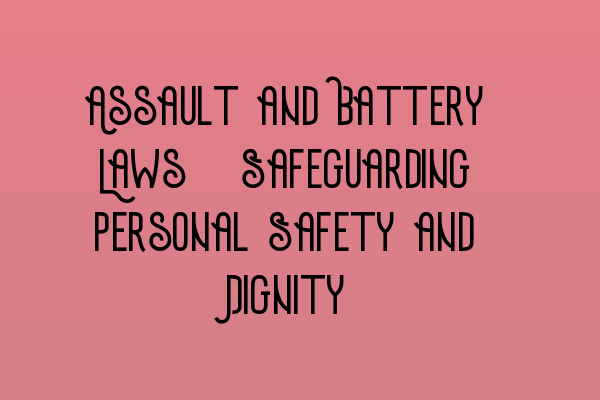Assault and Battery Laws: Safeguarding Personal Safety and Dignity
At SQE Criminal Law & Practice Law UK, we are committed to safeguarding personal safety and dignity through an understanding of assault and battery laws. In this blog post, we will explore the fundamentals of assault and battery and how these laws protect individuals from physical harm and emotional distress.
Understanding Assault and Battery
Assault and battery are two distinct but related offenses in criminal law. Assault refers to the intentional act of causing fear of physical harm or offensive contact in another person, while battery involves the actual physical contact that results in harm or offensive contact.
It is crucial to recognize that assault does not always involve physical contact. A verbal threat or the act of raising a fist in a threatening manner can constitute assault. On the other hand, battery requires physical contact, even if it is minimal or indirect, such as pushing, shoving, or striking someone.
Safeguarding Personal Safety
Assault and battery laws serve to protect individuals from physical harm and ensure their personal safety. These laws act as deterrents by imposing legal consequences on those who commit violent acts. By holding perpetrators accountable, victims are given a sense of justice and the opportunity to seek compensation for their injuries.
In the UK, the law recognizes that everyone has the right to live free from violence and threats. The Crown Prosecution Service (CPS) defines the boundaries of assault and battery, providing guidelines for prosecutors and law enforcement agencies.
Preventing Assault and Battery
While the legal system aims to address assault and battery after the fact, prevention is always the best approach. There are various steps individuals can take to reduce their risk of becoming victims of assault or battery.
Situational awareness is key. Being mindful of one’s surroundings, particularly in unfamiliar or potentially dangerous areas, can help individuals identify potential threats and avoid dangerous situations.
Additionally, learning self-defense techniques and taking personal safety courses can empower individuals with the skills and knowledge to protect themselves if the need arises. At SQE Criminal Law & Practice Law UK, we offer comprehensive SQE 2 Preparation Courses that can help individuals enhance their understanding of personal safety and self-defense measures.
It is also important to report any incidents of assault or battery promptly to the authorities. By providing accurate and timely information, you can contribute to the investigation and prosecution of the offender.
Conclusion
Assault and battery laws play a vital role in safeguarding personal safety and dignity. Understanding the definitions and distinctions between assault and battery is essential in recognizing and reporting these crimes.
At SQE Criminal Law & Practice Law UK, we are dedicated to promoting awareness of assault and battery laws. Our SQE 1 and SQE 2 Preparation Courses equip aspiring solicitors with the knowledge and skills needed to excel in their legal careers. Prepare for your SQE exams by practicing with our SQE 1 Practice Exam Questions and SQE 1 Practice Mocks FLK1 FLK2.
Stay informed about SRA SQE exam dates by visiting our website.
